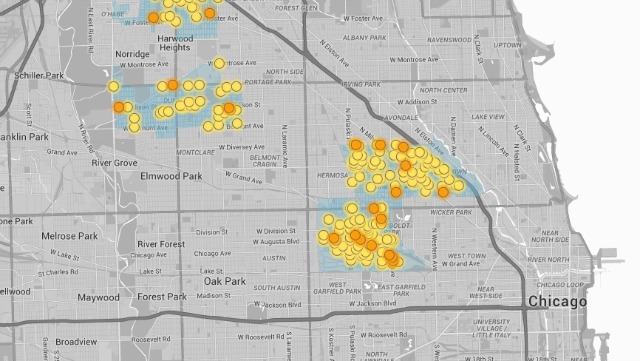Methane Leaks In Chicago Could Constitute Threat To Climate
By Jim Bochnowski in News on Jun 4, 2015 9:45PM
A new map from the Environmental Defense Fund and Google shows where possible methane gas leaks around Chicago could one day threaten the climate. As expected, older infrastructure in some of the city's more ancient neighborhoods is creating a concerning amount of gas leaks.
According to the Chicago Tribune, in order to create this survey, the EDF used a team of Google Street View cars outfitted with advanced methane-detecting equipment. The cars were then deployed to the Logan Square, Humboldt Park, Dunning, Norwood Park, Union Ridge, Washington Heights, Back of the Yards, Canaryville, West Englewood and Marquette Park neighborhoods from September to December.
I reached out to the EDF to find out why they focused on these neighborhoods to the Northwest, West, and South sides of the city, while ignoring the downtown areas which, presumably, have newer infrastructure and fewer leaks. I received a quote in response from Mary Gade, a consultant on the project and former Director of the Illinois EPA, who said the following:
"Chicago has one of the oldest natural gas systems in the country. Forty percent of the pipes are at least half a century old. The mapped neighborhoods reflect a cross section of the city as a whole in terms of age, density, demographics. In fact, it’s often the case that in less dense areas leaks are more likely to persist.”
You can see the results of the study here, and while a press release published by the EDF stresses that none of the leaks constitute what would be considered an "immediate" threat, they still believe it is necessary to address these issues before they become part of larger issues, such as climate change and increased energy costs.
Jonathan Peress, EDF's director of air policy for natural gas, told the Tribune that "Safety comes first; we're not arguing about that. But understanding how much methane is being emitted is really an important consideration for how you prioritize fixing leaks."
So it's now on the shoulders of gas companies, such as Peoples Gas, to fix this problem. But an audit last month showed that the company "mismanaged its multibillion-dollar program to replace aging pipes under Chicago streets, pointing to large delays and budget overruns that could lead to significantly higher bills for customers."
Peoples Gas seems to relish the challenge ahead of it. A spokesperson told the Tribune that "Our no. 1 priority continues to be the safety of our system, but reducing environmental emissions is an important component to our pipe replacement program. We welcome the collaboration on this new technology."
